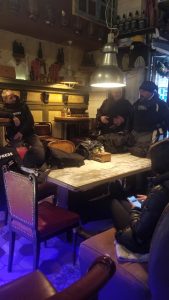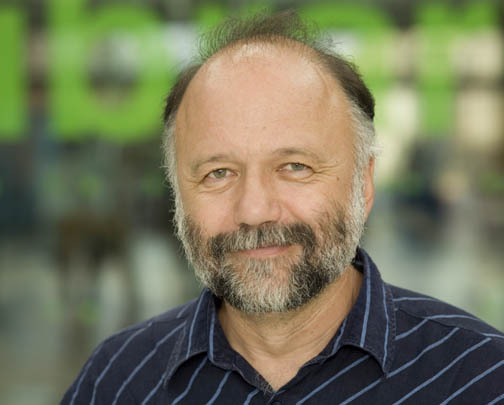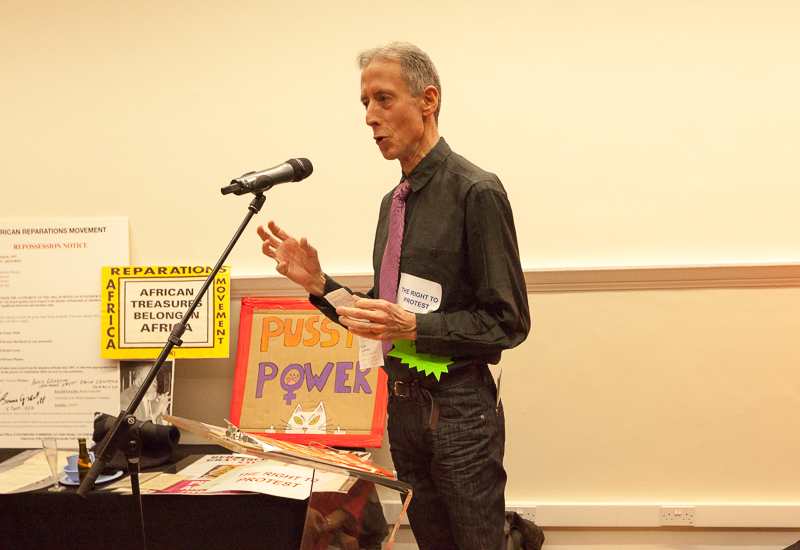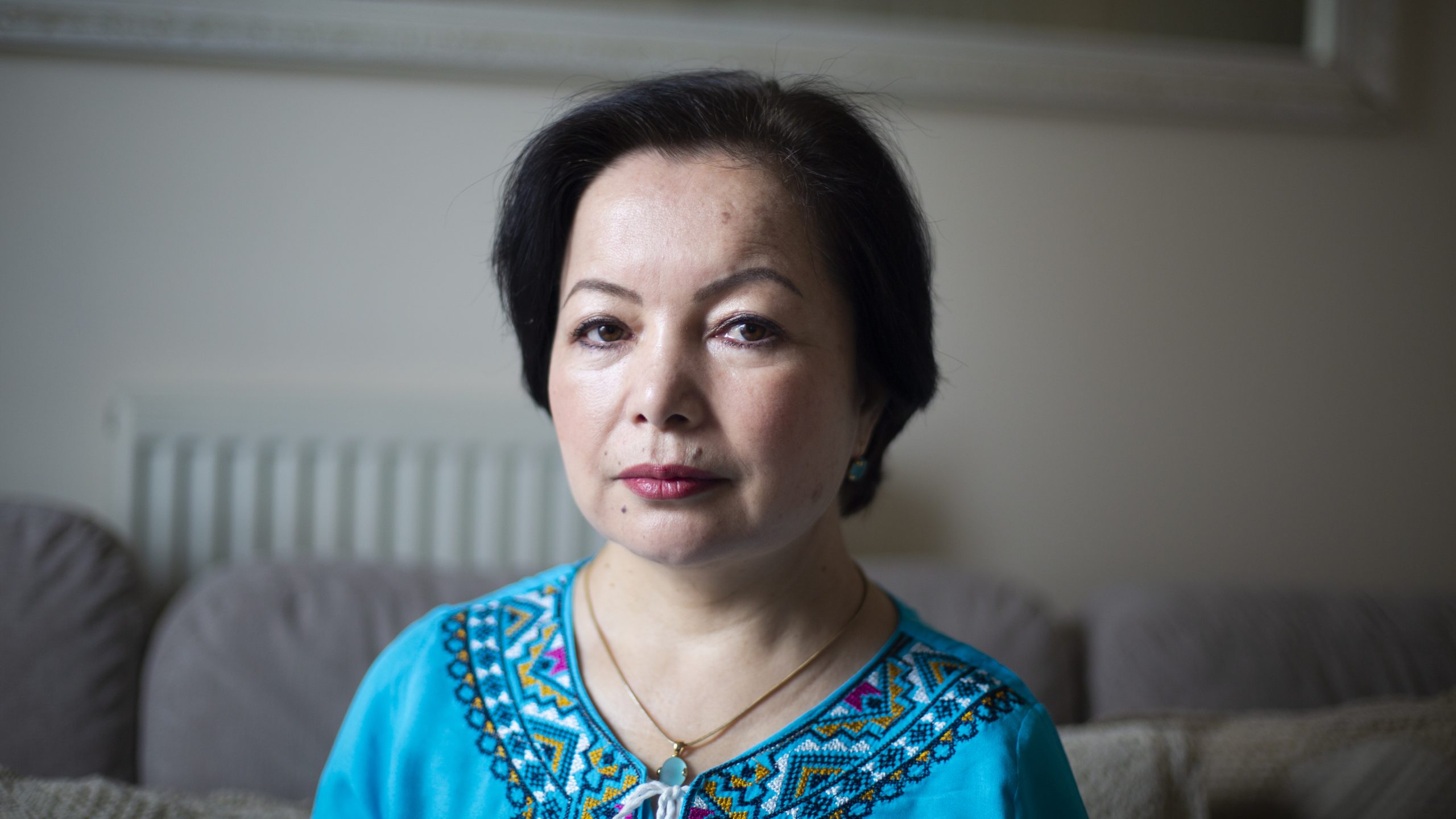28 Mar 2022 | News, Russia, Ukraine

Photo: Reporters inside Kyiv's Buena Vista Social Bar
There’s always a bar. In Kyiv, in 2022, it’s the Buena Vista Social bar, bang next to a Ukrainian police checkpoint which is both funny ha-ha and funny peculiar because there is a nationwide ban on the sale of alcohol. Sssh. It’s a joyful shebeen, Cuban-themed, run by Maks, and you never quite know what’s available to drink and who’s going to be there. All the women have a past; all the men have no future. You get the vibe.
Early on in the war, a fellow regular was a big bloke with a thick moustache and a mane of bubbly, curly hair, often seen with his fixer, a Ukrainian freelancer. I never spoke to him but I clocked him as someone who had presence, who was an interesting character, who I had probably seen in Sarajevo or somewhere like that. He was Pierre "Zak" Zakrzewski, she Sasha Kuvshynova, and they were both killed on 14 March 2022 when their vehicle came under fire in Bucha – pronounced Butcher – to the northwest of Kyiv. British journalist Ben Hall was wounded in the same attack. They were working for Fox News, something Zak, 55, who had been brought up in Ireland, had mixed feelings about. But he knew the risks of war too well and made a decision that working for a big corporate was better risk-management than being freelance. His co-workers at Fox loved him, giving him an award as “Unsung Hero” after he helped get Afghan freelancers out of Kabul.
Sasha was 24, bold and fiercely smart. After her death, her dad said that she learnt to read at the age of three and picked up English from reading restaurant menus while on family holidays. She was a fanatical photographer with five stills cameras, had founded a music festival for up-and-coming jazz musicians, worked as a DJ and wrote poetry. She wanted to make movies.
If you don’t like free expression in a democracy, you blow up the TV tower. The Kremlin’s first journalist victim was Yevhenii Sakun, 49, a camera operator for Ukraine’s LIVE station, on 1 March. The Russian army sent in four missiles in the evening, killing a worker in the TV tower complex and four civilians. The next morning I saw the people from the morgue take away the bodies of a middle-aged man and a mother and her child with my own eyes.
The most dangerous area of Kyiv is the northwest suburbs, where the Russian army’s offensive, driving down through Chernobyl, has come closest to the capital. Reporters seeking human stories, of refugees fleeing with their dogs on a lead or their cat in a box, went repeatedly to Irpin. Fearing further Russian advance, the Ukrainian army flooded the river plains near the suburb and blew up the most southerly bridge, leaving people to pick their way across the skeleton remains. Once beyond that crossing, there is a second bridge. That’s where US film maker Brent Renaud, 50, originally from Little Rock and formerly of the New York Times, found himself, filming refugees running for their lives. Brent knew what he was doing, having filmed and reported man’s cruelty to man in Iraq, Afghanistan, Libya: all the nice places.
At Irpin, at the second bridge, the Russian army shot him in the neck and he died of his wounds.
Oksana Baulina was one of those intensely brave Russians who were on Team Navalny before their champion was arrested on fake charges and the organisation broken up. Oksana, 43, was declared a “terrorist” by the Kremlin and had to flee Russia. She set up as a reporter and film maker in Poland and reported on the war. When Russian artillery smashed into a shopping centre in Podil, in the northwest of the city, she was killed.
To be honest with you I have done my best to avoid writing this piece for days now because it can only fill one with gloom to think of these brave truth-tellers sent early to their graves by the mobster in the Kremlin. But my pals and I in the Buena Vista are buoyed up the thought that we are in Ukraine exactly because Vladimir Putin does not want us to be here. And on that point, Mr Putin, do fuck off.
And the rum is good.
There is, also, the line from Tom Stoppard’s great play, Night And Day, which I quoted on Twitter while hurrying back from the bar just before – well, actually, just after curfew – had fallen. This, from memory, is how it goes, how the lover of the dead young journalist, played by Diana Rigg, killed on the frontline denounces the false romance of journalism, “it’s not worth the heart-break beauty queen or the crossword and it’s definitely not worth the leader.”
And the old hack, played by John Thaw, replies: “Yes, you’re right. But also the other thing. People do awful things to each other. But it's worse in places where everybody is kept in the dark. Information is light. Information, in itself, about anything, is light.”
RIP Zak, Sasha, Yevhenii, Brent and Oksana.
22 Mar 2022 | News
My nine-year-old granddaughter Lucia is a miracle. She speaks Russian fluently, without any taint of foreign accent. Paradoxically, she has never been to Russia. She was born in Covent Garden, London, and now lives in Bethnal Green. You can detect in her Londoner’s English a trace of a Yorkshire accent picked up from her father.
It’s not difficult to explain this miracle. Her Russian came to her, first, from her Moscow-born mother. My daughter arrived in England when she was the same age as Lucia is now. She has managed to retain her Russian despite her schooling in the UK. Lucia has also learnt her Russian while frequently spending time with me and my wife - we both emigrated from Russia when we were in our late twenties. The decision to emigrate four decades ago had cost us our Russian citizenships.
And so, since her early years my granddaughter not only heard Russian spoken at home but also learned to read - from the books that we ourselves used to love in our childhood. She fell in love with Pushkin’s poems and Chekhov comic stories, gothic tales of Gogol’s and absurdist children's poems by Chukovsky and Kharms; she became a great fan of Winnie the Pooh not only in English, but also of its brilliant Russian version created by Boris Zakhoder. Later Lucia was introduced (through YouTube and other channels) to witty, funny and inventive children's movies produced by independent Russian filmmakers. In short, she immersed herself in the world of images, vocabulary and ideas that have been shared by generations of children of the Russian liberal intelligentsia who used to regard the independent spirit of Russian literature as the best defence of their children’s consciousness against the onslaught of corrupt officialdom.
Lucia couldn’t describe the exact image of this dreamy Russia she had formed in her mind. What kind of mental construction could a child create out of the avalanche of words, pictures and ideas she had avidly been absorbing from books and films in Russian? Is it a fairyland with witches’ gingerbread huts on chicken legs or the one with Stalin’s skyscrapers looming grimly over old Moscow?
Each time when I heard Russian words streaming out of the mouth of my English granddaughter I felt as if I were present at some spiritual seance. Was she possessed by some Russian speaking ghosts? Should she be exorcised? But if it were a ghost, it was a benevolent one. The image of her fictional Russia was surely bright, enchanting and intriguing. For Lucia, it was the ideal country, because it was the place of her beloved mother’s childhood. It had also incorporated a dream of my sweet youth about Russia as the land of the free. Lucia was cherishing this dreamy land and wanted to see for real all that she had heard and read about. There were family plans for a trip to Russia, to celebrate New Year’s Eve in snowy festive Moscow.
And then, when Russia invaded Ukraine on Thursday 24th February something disastrous happened. On the Friday Lucia came back home from her primary school in Columbia Road in tears. School children were shown documentary shots depicting the brutality of the Russian invasion in Ukraine. She hasn’t been prepared for the shock. She hasn’t yet learned to separate the nation and its spiritual manifestations from the national government and its apparatus of suppression. What she saw was just the outright destruction of her fictional ideal Russia by the Kremlin’s dream murderers and mother-tongue abusers.
Zinovy Zinik is a Russian-born novelist, short-story writer and essayist. His fiction includes the novels The Mushroom Picker (1987), History Thieves (2010) and Sounds Familiar (2016)
11 Mar 2022 | News, Russia, Ukraine
As Putin continues his bloody invasion of Ukraine, the rest of the world continues to look for signs of an uprising in Russia that might provide a possible exit strategy without risking World War III.
In a country that has cracked down on protest ever since Index was founded in 1972, it can be hard to tell the real scale of opposition to the war.
What we do know, thanks to human rights group OVD-info, is that some 14,000 people from 140 cities have been detained by the authorities so far for exercising their right to object to the actions in Ukraine. On 6 March alone, 5,000 protesters were detained, including 113 juveniles and 13 journalists. Children as young as seven were detained for laying flowers at Moscow’s Ukrainian Embassy.
Arrests are often violent, with protesters beaten with batons and shot with stun guns. If convicted of breaking the harsh rules on protests, they face fines of up to 300,000 roubles (around £2,000 at the current exchange rate) and detention for up to 30 days.
One of Putin’s most vocal critics – the jailed opposition politician leader Alexey Navalny – has also been publicising the work of his supporters in taking the temperature of public opinion in Russia. Navalny is currently being held in a penal colony for three and a half years after being found guilty of a charge of embezzlement. A new court case started in mid-February in which prosecutors have accused him of stealing more than 350 million roubles in donations from non-governmental organisations.
On 8 March, Navalny (actually his lawyers and supporters outside prison, presumably with his blessing) tweeted a thread sharing the results of four opinion polls taken between 25 February and 3 March in Moscow, each including 700 participants.
Navalny said in his tweets, “Whether Russians actually support the hideous war that Putin has waged against Ukraine is a matter of utmost political importance. The answer to this question will largely define Russia’s place in the history of the 21st century.
“It’s one thing if Putin killed Ukrainian civilians and destroyed life-critical infrastructure with full approval from the Russian citizens. However, it’s a whole different story if Putin’s bloody venture is not supported by the society.”
The polls showed that Muscovites view of the role of Russia in the conflict rapidly shifted, with 53% by the end of the polling saying Russia had taken on the role of aggressor in the conflict against 28% who felt Russia was a liberator and 12% who saw them as a peace-maker.
In the same period, the number of people who felt Russia was the guilty party more than doubled from 14% to 36%,.
By the end of the four polls, 60% of those surveyed felt there would be a catastrophic collapse of the Russian economy as a result of the invasion.
By 3 March, some 79% of those asked said the conflicting parties should immediately cease all military operations and engage in peace talks.
Commenting on the findings, Navalny tweeted: “The nature of these changes is plain and unambiguous: people rapidly begin to realise who is responsible for initiating the conflict, as well as the war’s true objectives and possible outcomes. Undoubtedly, the Kremlin can see these dynamics as well, hence the nervousness, the desperate attempts to end the war campaign as soon as possible."
He added: “The anti-war momentum will keep growing across the society, so the anti-war protests should not be halted under any circumstances.”
In a thread a few days earlier, Navalny had dubbed Putin an “obviously insane czar” and added: “Putin is not Russia. If there is anything in Russia right now that you can be most proud of, it is those… people who were detained because - without any call - they took to the streets with placards saying ‘No War’”.
“We must, gritting our teeth and overcoming fear, come out and demand an end to the war. Each arrested person must be replaced by two newcomers. If in order to stop the war we have to fill prisons and paddy wagons with ourselves, we will fill prisons and paddy wagons with ourselves.
He concluded: “Everything has a price, and now, in the spring of 2022, we must pay this price. There's no one to do it for us. Let's not ‘be against the war’. Let's fight against the war.”
Others would have you believe that Putin has wide support for his actions. The state-controlled pollster VCIOM said that Putin’s confidence rating among the public had grown from 73% to 7.4% between 4 and 11 March.
A 5 March poll by the organisation found that 71% of Russians support the decision to conduct what they call the “special military operation” in Ukraine with 46% of Russians believing the operation “aims to protect Russia and prevent the deployment of NATO military bases on the territory of Ukraine”.







